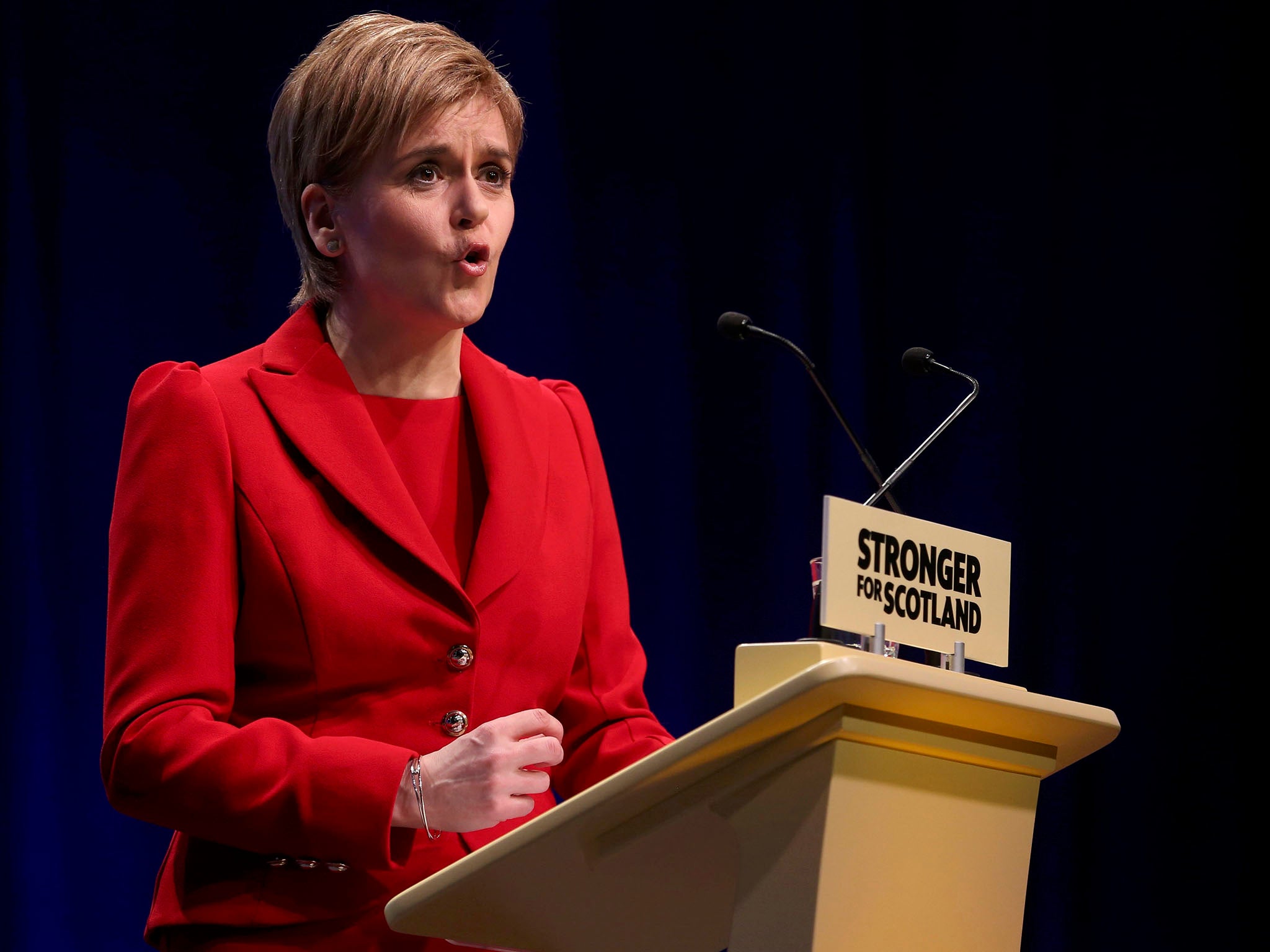Nicola Sturgeon says she will overrule George Osborne’s tax break for higher earners
SNP leader says decision to raise threshold at which workers start paying 40p income tax rate to £45,000 was 'wrong'

Your support helps us to tell the story
From reproductive rights to climate change to Big Tech, The Independent is on the ground when the story is developing. Whether it's investigating the financials of Elon Musk's pro-Trump PAC or producing our latest documentary, 'The A Word', which shines a light on the American women fighting for reproductive rights, we know how important it is to parse out the facts from the messaging.
At such a critical moment in US history, we need reporters on the ground. Your donation allows us to keep sending journalists to speak to both sides of the story.
The Independent is trusted by Americans across the entire political spectrum. And unlike many other quality news outlets, we choose not to lock Americans out of our reporting and analysis with paywalls. We believe quality journalism should be available to everyone, paid for by those who can afford it.
Your support makes all the difference.Hundreds of thousands of Scottish workers are likely to start paying more in tax than their English counterparts for the first time from next year, after Nicola Sturgeon signalled her intention to overrule George Osborne’s tax break for higher earners.
The SNP leader said the Chancellor’s decision to raise the threshold at which workers start paying the 40p income tax rate to £45,000 was “wrong”, adding that she would “not take that same choice” when she unveils her own tax plans at the Scottish Parliament next week.
However, concerns were immediately raised that embracing a different tax regime from the rest of the UK could put a dent in the country’s finances, by forcing higher earners out of Scotland and putting pressure on businesses to offer higher salaries to compensate workers for their lost earnings.
Holyrood is set to be handed control over Scotland’s income tax rates and bands from April next year. This will allow whichever party wins May’s election to cancel Mr Osborne’s changes, which would have handed Scotland’s 372,000 higher rate earners a collective tax break of £190 million.
On 17 March, Ms Sturgeon said she would not follow the Chancellor’s lead, telling MSPs: “I think George Osborne’s decision to cut taxes for 10 per cent of the population at the highest end of the income spectrum is the wrong choice and I will not take that same choice.”
Labour and the Liberal Democrats are also against increasing the 40p threshold, with all three parties arguing that it would be wrong to give wealthier people a tax break at a time when Scotland’s public services are being squeezed. But Scottish Conservative leader Ruth Davidson said she did not want to see a sign at the border saying “higher taxes here”.
Alexander Garden, head of the tax and succession team at the Scottish legal firm Turcan Connell, said that while the changes were not significant enough to force large numbers of higher rate taxpayers living north of the border out of the country, many would be tempted.
“Some people are mobile enough and may already have interests north and south of the border, so it wouldn’t take much for them to decide to be resident for tax purposes elsewhere in the UK,” he said. “But my gut feeling is that’s probably not going to lead to a massive number of people voting with their feet.”
However, he added that a “tipping point” may occur if the English tax regime became significantly more attractive to Scotland’s higher earners in the future. “As the Scottish Government starts to use these new powers, people are going to have to be constantly looking at what the differences are between Scotland and the rest of the UK,” he said.
Scottish businesses looking to recruit top talent would also have to “get imaginative” with their job packages in order to overcome the issue of higher taxes, offering employees higher salaries than in the rest of the UK, Mr Garden said, which would come at a cost.
Jack Perry, the former chief executive of Scottish Enterprise, also warned that driving away the country’s higher earners would weaken the country’s tax base and potentially depress the economy, which would carry knock-on effects for public services.
“In many other countries with varying tax regimes, there is evidence that if one part of a country has substantially higher taxes, then people simply move their wealth and income away,” he wrote in a newspaper opinion piece. “Many of Scotland’s higher earners already spend much of their working lives in London and overseas. It would take very few of Scotland’s mere 17,000 45 per cent taxpayers to take up residence where they already work to make a huge dent in Scotland’s finances.”
Join our commenting forum
Join thought-provoking conversations, follow other Independent readers and see their replies
Comments